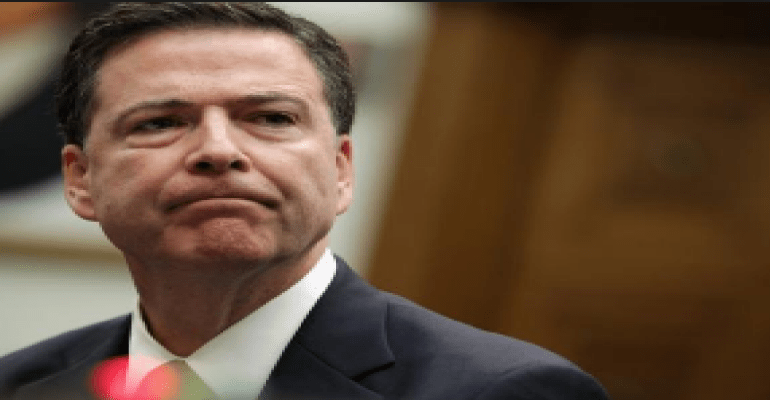
Director Comey, in his testimony before the Senate Intelligence Committee, called President Trump a liar. Yet, which person, Trump or Comey, was intimidated by the other? Who was it that was afraid of telling the President that a certain question may be inappropriate? Who was it that leaked papers, an unauthorized disclosure, to the New York Times, through a close friend?
Jim Comey came across as weak, unable to respond to the President honestly, and offended when, if it occurred as alleged, Trump asked for his loyalty. There is nothing wrong with the question. Bosses do not hire people who will be disloyal. Comey forgot that loyalty is a two way street – the President needs someone that is loyal to him and who is willing to tell the President what he may not want to hear.
Why did Comey fail to seek Loretta Lynch’s recusal in the Clinton email server case? He was apparently aware of a document written by a Democrat operative that indicated Lynch would have protected Clinton in the email probe. If Comey was honest, he would have resigned at that time.
Why did Comey acquiesce to Loretta Lynch’s demand that he refer to the Clinton criminal investigation as a “matter” instead of “investigation.” The Justice Department knew the FBI probe was not only an official investigation but a criminal investigation. If Comey was honest, he would have resigned at that time.
Comey told the committee that he wrote memos about his meetings with Trump (but not Obama or Bush) because he thought Trump might lie about the meetings. On what basis did Comey come to this conclusion? In fact, it would appear more factual that Comey wrote his memos of Trump conversations after he was fired as retaliation against Trump.
Why didn’t Comey write a memo about the Clinton-Lynch meeting on the tarmac? Why didn’t Comey write a memo concerning Loretta Lynch interfering in the FBI investigation of Hillary Clinton? Why didn’t Comey write a memo about the unmasking of innocent Americans?
In sworn testimony in May 2017, Comey denied leaking under oath. He denied being an anonymous source for New York Times stories. Yet in testimony on June 8th, he admitted having a friend leak copies of memos to the New York Times. Comey is not the straightshooter that he would have people believe he is.
Comey defended the independence of the FBI. The FBI is still part of the executive branch. The independence that Comey talked about reminded me of the FBI under J. Edgar Hoover, perhaps the most corrupt FBI director in history. Is Comey talking about recreating a rogue FBI again? Does this FBI exist already?
A former intelligence contractor has filed a major lawsuit against former Director Jim Comey and other government officials for allegedly covering up evidence of illegal surveillance on Americans. The suit, filed June 5, 2017, was assigned to a federal judge who has previously ruled against some of the NSA’s surveillance practices.
The contractor, Dennis Montgomery, who took 47 hard drives from the NSA and CIA, claimed the NSA and CIA unmasked over 20 million Americans, including American judges and President Trump. Mongomery and his attorney, Larry Klayman, are working with the FBI.
Comey’s testimony essentially showed President Trump as truthful with regard to Comey telling the President on three occasions that the President was not the target of a counter-intelligence investigation. But interestingly, the FBI leaked just about everything but the fact President Trump was not the target of investigation. Why? This question needs to be asked.
The former FBI director is now the subject of an ongoing investigation by Justice Department’s inspector general as to his potential violation of protocol in the Hillary Clinton email server case, which raises another troubling issue: his relationship with the Clintons.
In 1996, Jim Comey acted as the deputy special counsel for the Senate committee investigating the Whitewater scandal. While some people connected to the Whitewater company were arrested and charged with crimes. Comey eventually acknowledged that Hillary Clinton obstructed the investigation and destroyed evidence, but he decided not to prosecute due to Clinton’s “lack of intent.”
Then, in 2016, Comey accumulated enough information about Hillary Clinton’s email server and mishandling of classified information. Comey condemned her actions yet did not prosecute due to her “lack of intent.” Sound familiar? Intent was not needed for prosecution. In doing so, Comey violated FBI and Justice Department policies and protocol: usurping power he did not have. Comey illegally assumed the judgment, authority and privileges of the Attorney General.
Now that Comey is gone, the Justice Department and FBI should re-examine the Hillary Clinton case. In fact, Judge Napolitano stated that Rode Rosenstein review the Hillary Clinton file, and decide anew whether to have Hillary Clinton “indicted for espionage and failure to safeguard state secrets while she was Secretary of State.”
Additionally, the Department of Justice should examine the relationship between Comey, the Clintons and the Clinton Global Initiative. Was Comey part of the “pay for play” strategy the Clintons used?
It is now quite evident that James Comey was a swamp denizen and part of the problem.
